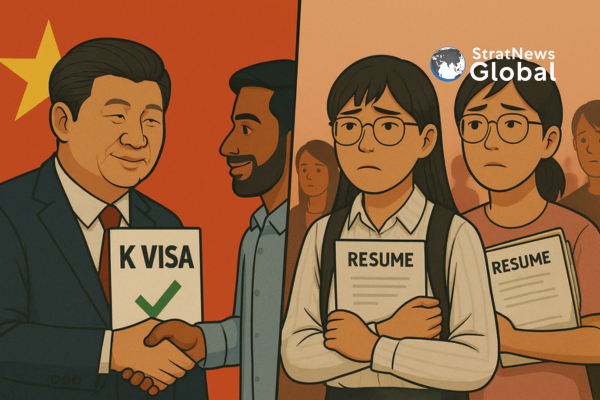China’s social media has exploded over plans for a “K” visa that will open the domestic job market to highly-skilled foreigners. The new visa was announced in August which will be implemented on Oct 1, China’s National Day.
Posts on Weibo against this new implementation reflected anger and frustration. “We might as well raise the Indian flag,” went one post, anticipating a flood of Indian techies now that the US is cracking down on H-1B visas by making them expensive.

“We can’t even find jobs ourselves, now there will be more competition,” warned another post, “Can domestic students also get the same benefits as foreign graduates?”, asked a third.
The fear and insecurity is genuine. China’s youth unemployment is estimated to be as high as 14% and it has spawned some bizarre trends including “pretend to work”, where young people pay a company for space to sit during work hours although they have no work.
The government may have anticipated this reaction. An editorial in state-run Global Times delicately addressed the issue by stating that the “K” visa is not like the US H-1B.
“China’s “K” visa is intended to promote exchanges and cooperation between young Chinese and foreign science and technology professionals. Its core purpose is to serve international talent exchange and collaboration in scientific innovation rather than to simply provide a work permit.”
But it also notes that “China’s institutional opening up … reflects its own strategic development needs. This demonstrates China’s openness and confidence.”
According to CCTV, holders of the K visa will enjoy easier multiple entry, longer stays, and the ability to apply without the backing of a Chinese employer or sponsor. Eligible applicants must have at least a bachelor’s degree in a STEM field from a recognised university or research institution, or already be working in a related sector. But social media continued to boil.
“Yeah, we have surplus undergraduate jobs in China, right?” a user posted on Weibo. Another warned: “One must act with utmost caution. The basic threshold should be that they contribute to China and genuinely love Chinese culture. Do not, in the pursuit of short-term gains, lower the standards lest you suffer a great loss for a small gain and become a historic sinner of the Chinese nation.”
The irony is China has no shortage of highly skilled tech professionals. But the Communist Party sees a need to project itself as an open hub for innovation at a time when the US is closing its doors.
The government may see the “K” visa as a tool to sharpen its edge in the global talent race, but for many young Chinese, it is a reminder of where they stand: anxious, overlooked, and increasingly vocal in their dissent.
Research Associate at StratNewsGlobal, A keen observer of #China and Foreign Affairs. Writer, Weibo Trends, Analyst.
Twitter: @resham_sng





